It’s often said that the two things that ought not to be talked about in polite company over the dinner table are politics and religion. With impeccable timing, Nielsen delivers us a poll about both that you can wave around at friends and family that deserve a good snarking over the next few days 😛
Parts of this poll were published around the traps in Fairfax media last week – but we’ll take a closer look at it, including the cross-tabs that weren’t reported. It carries a sample size of 1000, giving us an MoE that maxes out around the 3.1% mark – although we’ll be dealing with subsamples here that will generally have margins of error around the 4-5% mark unless stated otherwise.
To get the raw data, Nielsen asked the following questions:
Nielsen questions:
1. I’d like to start by asking you whether you believe in God or a universal spirit?
[If yes] Is that God or a universal spirit?2. And how certain are you about this belief? Are you: Absolutely certain, Fairly certain, Not too certain, Not at all certain?
3. Which religion do you belong to or most closely identify with…?
4. How important is religion in your life? Is it: Very important, Somewhat important, Not too important, Not at all important?
5. I would like to ask you about some things that some people believe. For each one I read out can you tell me whether you believe it or not: Jesus Christ was a real person who lived 2000 years ago, Jesus Christ was the Son of God, The mother of Jesus Christ was a virgin, Jesus rose from the dead, Life after death, Heaven, Hell, Miracles, Angels, Astrology, Witches, The devil, UFOs, Psychic powers such as ESP
6. Which of the following statements best describes your view on the origin and development of human beings?
-Human beings developed from earlier forms of life over millions of years in a process guided by God
-Human beings developed from earlier forms of life over millions of years and God played no part in this process
-God created human beings, largely in their present form, at one time in the last 10,000 years or so7. Which comes closest to your view: [Relevant religious text] is the word of God,
[Relevant religious text] is a book written by men and is not the word of God?And would you say that: [Relevant religious text] is to be taken literally, word for word or Not everything in [Relevant religious text] should be taken literally, word for word?
8. Which of the following statements best describes your view: There is only one true way to interpret the teachings of my religion or There is more than one true way to interpret the teachings of my religion?
9. If a political candidate in your area actively promoted themselves as a ‘Christian candidate’ would that make you more likely to vote for them, less likely to vote for them or would it make no difference?
10. Do you agree or disagree with the following statement: “religion and politics should be separate”?
First up – one of the more interesting things in the results was the way respondents who believe in God or a Universal Spirit (“Believers” in the tables and charts below) were also more likely to believe in other meta-phenomena like astrology and UFOs compared to those “Non-Believers” that did not believe in God.
The other interesting cross-tab here is the significant difference between Male and Female respondents.
We’ll run the tables for the two cross-tabs, as well as a scatter diagram to make it visually stand out. Everything is in percentages.
Throughout this entire poll, males were far more sceptical than females on just about every topic. I fact, only on the topic of “Miracles” did both male and female levels of belief surpass 50%, and only on the topic of ‘UFO’s” did male belief in the subject matter (38%) exceed female belief (30%). All the other issues named had larger proportions of female believers than male.
On the other chart, it measures the proportion of believers in God or a universal spirit that also believe in a number of selected issues, as well as the proportion of non-believers in God on those same selected issues. If a person believes in God or some Universal Spirit, they are more likely to also believe in astrology, UFOs, miracles etc than atheists or agnostics.
Next up, the evolution, intelligent design, creationism data.
Those state estimates can have very small sub sample sizes, so treat them as only broadly indicative rather than statistically rock solid. All states apart from Tasmania are roughly consistent with each other, suggesting that one state is pretty much akin to another on the issues.
The demographic breakdowns though were a bit more interesting. Although evolution had a plurality of support in every demographic except females (perhaps a tidbit worth saving for any snarky, rationalist female friends or relatives you might come across at Christmas! 😛 ) , it only achieved a majority support among Males (50%), 18-24s (50% – but very small sample) and atheists/agnostics at 86% (which is to be expected).
Next up – and really an exercise in stating the obvious – if we take Question 7 on religious texts and break the results down by the responses to questions 2 and 4 on religious certainty and religious importance, we get:
What we find is that the more certain is a persons belief and the more important religion is to their lives, the more likely it is that they will believe that their religious text is actually the word of God rather than the interpretation of humans. What did surprise me though is the gradual increase between each cohort here. Literal interpretations of religious text aren’t just something that happens when a person becomes a religious fundamentalist – it increases consistently as religion becomes more important to people and they become more certain in their beliefs.
Finally, questions 9 and 10 – whether a political candidate actively promoting themselves as Christian gets an electoral benefit, and the big question of religion and politics being or not being separate.
Among every cohort except women (again!) and believers in God or a Universal Spirit, a candidate promoting themselves as the Christian candidate would be worse off in net term. With “Believers” it’s only a +3 gain, yet among atheists and agnostics it’s a whopping -19!
On the question of whether religion and politics should be separate, it’s an absolutely rock solid conclusion in every cohort – even among believers.

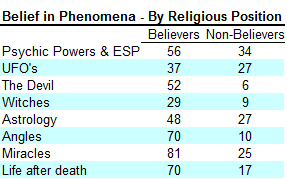
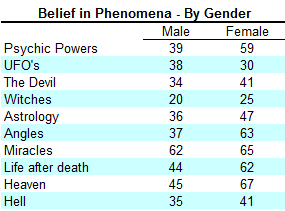
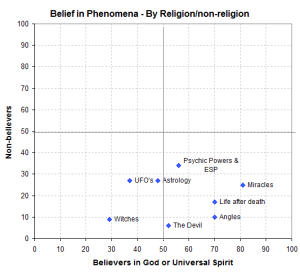
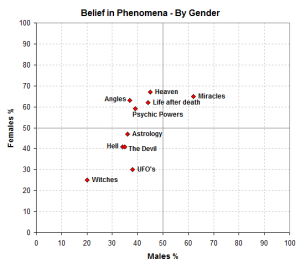
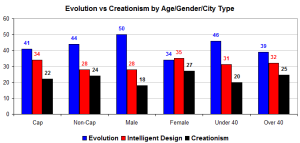
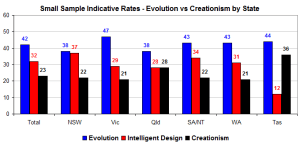
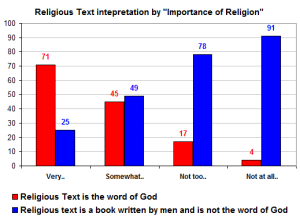
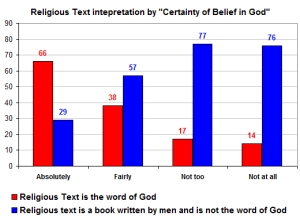








Crikey is committed to hosting lively discussions. Help us keep the conversation useful, interesting and welcoming. We aim to publish comments quickly in the interest of promoting robust conversation, but we’re a small team and we deploy filters to protect against legal risk. Occasionally your comment may be held up while we review, but we’re working as fast as we can to keep the conversation rolling.
The Crikey comment section is members-only content. Please subscribe to leave a comment.
The Crikey comment section is members-only content. Please login to leave a comment.